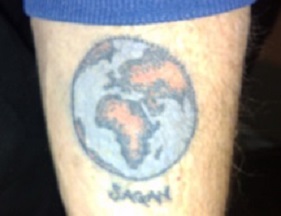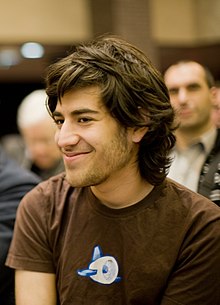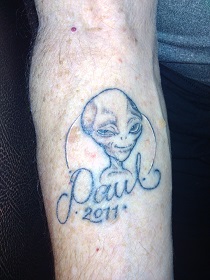Steve Jobs might have said: 'Because Buddhism haunted me'.
I echo that, because MANY things haunt me. (Which is a good thing!)
Sagan's 1995 interview with Charlie Rose Evening news after Sagan's death (age 62)

Left-forearm tattoo [ It says "Sagan", below the earth ]
You can watch Sagan's original "Cosmos" series, on one of my video-pages... here
The Importance of Philosophy
It was a long journey for me, but a very important one. My introduction began in 1967...I was freshly discharged from 3 years in the U.S.Army ... back in college beginning my junior year at Montana State University (Bozeman, MT). My instructor was a fellow student from NYC (Queens), had the good fortune of learning about Objectivism while still in high school, and then teaching it to me.
It taught me the importance of learning about and physically exploring the world. [ The rest, as they say, is history. ]
Epistemology and esthetics are my favorite branches of philosophy
Carl Sagan , Neil Young, and John Prine are all mentors of mine. All can 'articulate me'.
Carl's and Neil's interviews with Charlie Rose say a lot.
[ I perceive them all to be 'secular humanists' (as I am). Here's a list of well-known secular humanists. ]
For a great Neil Young interview with Charlie Rose, click here
(Hint: Set the slider to the 01:40 point, to get beyond Neil's long verbal chit-chat.)
A most articulate modern man: Jordan Peterson
(9 mins) (75 mins)
There are MANY more of his talks on YouTube
A fav quote from the Urban Dictionary: 'Speak Truth to Power'
"Speak Truth To Power" I'm still in mumble-mode on this saying. But, it's making the rounds lately and it struck a cord.Of course, there's a sub-story here and a lesson learned. The lesson is that the Internet is mankind's greatest invention, in my view. Because it functions as a distillation of what's most important to humans on this planet. So, one answer back to Neil..I too, do not have a single 'book' containing the answers. [No one does.] But, we DO have the Internet, and it is the key to finding the answers.
The breakthru concept in the software world has been 'Open Source Software' ('OSS')
Read this nutshell-history of 'open source'So, if you've read and disgested the open-source nut-shell-history (above), you now understand why those of us who are open-source advocates prefer Google's open-source-based 'Android' OS' and 'Chrome OS', to Apple's 'iOS'. We're NOT claiming Android is functionally better or more popular...but rather we're just paying tribute to the fact that Google continues to make full source code available for their OSes, while Apple continues to engineer their smartphone/tablet "iOS" operating system using closed, proprietary codebases..
Similarly, the open-source nature of the Linux OS continues to benefit serious academics and developers in software engineering. It is the paradigm example of open-source products.
Ok, read this relevant real-world article: a comparison of Apple iOS (closed-source) vs Google Android OS (open-source)
Android vs iOSThe concept of open-source software is implemented as a software repository, at the GitHub website. One of it's most recent announcements is here
My overall fav website is wikipedia...aka, 'the encyclopedia of the Internet'.
It proves the adage that 'cream rises to the top'
Wikipedia
You can find info on virtually everything on wikipedia. And trust that it is the world's consensus information on any given subject.
My second fav site is StackExchange, w/ its expert forums on many subjects.
StackExchange family of sitesI wrote more details about it on my StackExchange details page.
Another of my fav sites is "Ted talks"
Example #1: A stroke of insightExample #2: Re-thinking infidelity
Example #3: Let's talk about sex
Are you familiar with the tale of Aaron Swartz?
Do you recognise this young guy?
Ok, you probably would not recognise him. Let me introduce you to him...his name is Aaron Swartz...read this
I hope you took the time to read thru that writeup. This too is all about why open-source software is so important and why the practice of issuing software patents really ought to be discontinued.
The bottom line is that his story shows how easy it is for some over-zealous lawyers to confuse things to the point where a relatively naive and innocent creative person can run afoul of our laws and see only one way out. (Sigh.)
Movies are magical (They are one of my primary haunts)
Here's my ranked movie-list of 're-watchable movies' in my movie collection :One conversation from the movie "No Country For Old Men (2007)" is:
- Carla Jean: [Having also awoken before dawn] What are you doing, baby?
- Llewelyn: [Filling a gallon jug with water] I'm going out.
- Carla Jean: Going where?
- Llewelyn: There's something I forgot to do, but I'll be back.
- Carla Jean: And what are you going to do?
- Llewelyn: I'm fixin' to do something dumber than hell, but I'm going anyways.
And a favorite conversation snippet from the movie "Paul (2011)" is:
- Paul: [an alien][Lighting a joint and taking a hit] Do you guys partake?
- Graeme Willy: No. Thank you.
- Ruth Buggs: I'll partake.
- Paul: Are you sure? It's pretty strong shit.
- Paul: I get it from the military. I think this is the stuff that killed Dylan.
- Graeme Willy: Bob Dylan's not dead.
- Paul: [smiles] Isn't he?
Fav political pundits
A 'must-see' 6-min video. I award "TWO-THUMBS-UP" to Lawrence's unique political viewpoint on what SOCIALISM actually is.
[ Lawrence's key point is that ALL societies have some degree of socialism. The US social security system is one example. The US postal system is another. ]
The Electoral College is unbalanced, unfair to voters in most states, and needs to be eliminated.
Here's Chris Hayes (MSNBC news anchor), explaining why the Electoral College has ALWAYS been obsolete:Here's a history lesson summary of the origins of the US Electoral College.
Here's an explanation of battleground / swing states
===========================================================================
I agree with Chris, and I have an additional LOWER TURNOUT issue. Here's a test question: "How many of the 50 states are NOT ''winner-take-all"? The (surprising?) answer is: Just TWO! (Maine and Nebraska...they apportion the popular vote to their party-voting-members, who will attend to cast their ballots and then certify those votes, to determine which of the two candidates has won the election and thus is the new U.S. president.
So, now contemplate the ramifications of this rule! This is what RED and BLUE states are all about...and why the TURNOUT in the national election is so low! The large state of California is quite BLUE. So, say you were planning to vote REPUBLICAN in that DEMOCRAT-leaning state. Or conversely, say you live in Oklahoma, and were thinking of voting for the DEMOCRAT in that REPUBLICAN-leaning state. The research data on this thesis indicate that what happens is that many such voters suddenly realize that all of the votes in their state's electoral college are gonna be cast against their choice, so that they tend to say to themself "The hell with it...I've got better things to do than stand in the voting line...why bother...my single vote can't possibly win in this state....I can rest assured that ALL my state's electoral votes will go to the person who I am NOT planning to vote for." [ And, conversly, if you favor the dominant party's candidate, you'll conclude that your vote will be superfluous...that your dominant party's marjority is going to win, so your vote can't possible flip the outcome. ]
Bottom line, it's the votes from citizens of the 'battleground states' (aka 'swing states') that are going have the most weight in determining the outcome of the election.
Here's a discussion about how your state may have affected the election outcome in 2016.
If you care about the exact details, the actual data shows that there was a "negative zero-point-five [ -0.5 ] statistical correlation" in the 2016 presidential election, between turnout in the red-est and blue-est states, and turnout in closely-balanced (aka ''swing" / "battleground" / "purple" states). [ Here's a math-statistics review in layman's terms: Correlations can range from negative one-point-zero (-1.0) to positive one-point-zero (+1.0). A 0.0 correlation thus means 'no correlation/no-relationship', whereas a 1.0 means 'exactly-correlated'. When variables are plus/positively correlated, it means the values move in same direction with each other. When variables are minus/negatively- correlated, the values move in opposite directions from each other. ]
Ergo: If we were to get rid of the electoral college (and switch to just having the popular vote of the whole country determine the winner), the voter turnout in America would thus IMPROVE significantly! This idea is a no-brainer...let's go make it happen. (To do this, each state needs to separately vote to drop out of using the electoral college, and three-fourths (38 of 50) of the states would need vote for that, to amend the constitution to declare the electoral college null and void.) [Alas...as a cynic, I doubt this will ever get changed. Sigh.]
For completeness, here is an article and chart, showing the voter turnout percentages among the world's democratic countries: Turnout comparison info
===========================================================================
Ok, here's how Fareed Zacharia and Ezra Klein demonstrate the unequalness of the Electoral College.(begin viewing at the 2:55 mark):
Music is magical (and is another of my primary haunts)
Simon & Garfunkel can capture it: The BoxerAs does Arlo Guthrie: City of New Orleans...(written by Steve Goodman)
Rolling Stone Mag's #1 choice for greatest song, from the master of lyrics: (Of course...a no-brainer)
Here's a recently discovered song. Talk about resonating...it did, first time I heard it.
And, it's from Africa...that place we've ALL migrated from.
[ If you prefer seeing just lyrics, here's it's 'lyrical' edition. ]
Lastly, here's an embed of Jackson Browne's group doing "The Load Out / Stay"
Speaking of magical...do you grok the magic of pheromones?
Thanks to 'Willy' (aka, my Princeton-graduating, then Peace Core-participating, lifelong friend Bill) for this biology lesson
Wikipedia, of course, knows ALL about 'pheromones' of various kinds.Ah, that sheds light on why your dog sniffs the butt of every other dog he meets and greets.
I recently learned that lady-bugs can detect others of their species, from one quarter of a mile away, via pheromones.
i.e. scroll down to the 4th paragraph in this writeup about ladybug home infestations.
Whitewater-kayaking
The whitewater came last...which I began at age 52. Long before that, I had acquired both private-pilot and sailplane-pilot licenses, made 280+ skydives (never even needing to deploy that "reserve" parachute), and co-owned a 33-foot racing sailboat, which we sailed in Lake Winnepisaukee, and in the Atlantic, off both the Maine and Florida coasts.
It was the whitewater-kayaking that TRULY resonated. After graduating into class IV water, some sort of Zen-like experience began happening. You can get to a calm state mentally/normal-breath-rate, even while bombing thru big-water rapids.
What a dance it isHere's the webpage I built, showing markers for all the New England 'put-in' locations that I frequented.
And here's my HUMOR-tribute to Subaru (for transporting my kayaks over the years).
==========

Right-forearm tattoo [ a tribute to the movie "Paul (2011)" ]

Quotes from the alien Paul:
(Ruth's assertion): "We're all made in God's image."
(Paul's retort): Then how do you explain me?"
[ Pic and dialog are from movie "Paul(2011)" ]
==========
This Rand Paul guy (a doctor turned politician) gives more centrist conservatives a bad look.
